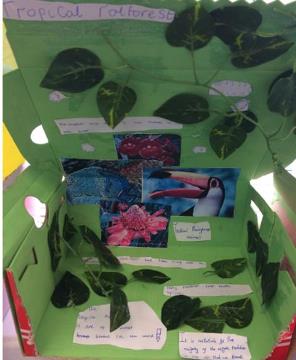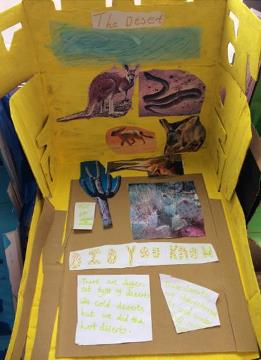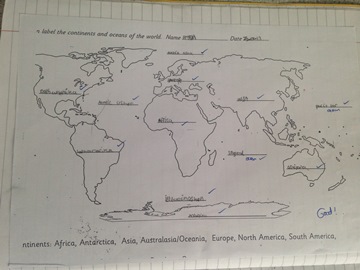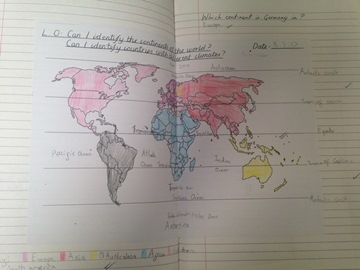In 2016/17, Shahed Ahmed at Elmhurst Primary School aimed to improve the quality of pupil learning in Geography in the school through developing teachers’ subject knowledge and subject-specific pedagogies. He also wanted to develop a shared understanding of what good Geography is, in order to raise the profile of the subject within the school curriculum.
Background
Monitoring of pupils’ work across the school had suggested that teachers lacked a coherent sense of what geographical learning entails – as such, the school’s provision was inconsistent, with the subject being interpreted differently by different teachers, which led to learning of varying quality.
Aim
Mr Ahmed looked to ascertain the extent to which engaging teachers in subject-specific training – both compulsory and voluntary – could impact upon learning outcomes for pupils.
It was hoped that through providing regular training opportunities for teachers to engage with Primary Geography, a more coherent understanding would develop of ‘what Geography looks like’, and this coherence would allow teachers’ confidence and capability to improve when teaching Geography.
Method
Year 1:
An initial questionnaire was completed to ascertain the teaching staff’s attitude and confidence towards the teaching of all subjects. A further questionnaire then collected data explicitly about Geography, and about individual teachers’ experience of subject specific training, through initial teacher training as well as through INSET and CPD.
From September 2015, Geography training was provided in whole-school INSET at least once a term, and further opportunities for training and CPD was provided for teachers who wished to opt-in for additional training. This regular provision continued.
Year 2:
The take up of voluntary sessions was monitored and Geography INSETS in school were organised and carried out. Pupil interviews were also conducted during bi-annual subject monitoring, to ascertain pupil voice alongside monitoring of the quality of work.
At the end of the 2015-16 academic year, full reflective monitoring had taken place of pupils’ teaching and learning in Geography, measured through: monitoring of pupils’ exercise books, reading of teachers’ annotated lesson plans, pupil voice interviews.
Year 3:
The RGS Geography (a subject hub for London) provided staff with more additional training. The hub also enabled the new Geography Coordinator to attend training and meetings and consequently lead her own CPD training on Fieldwork for the Newham Hub.
Teacher surveys were conducted into the attitudes towards different subjects taught in the school, focusing on the same indices as were covered in the baseline assessment survey
At the end of the 2016/17 academic year, the new coordinator collected further data to ascertain the extent to which pupils’ learning has changed over the three years, through comparison of books and data over time, including a) Book Scrutiny b) Exploring teacher planning c) Reviewing pupil voice data on the subject.
Evidence
- Qualitative appraisal of pupils’ exercise books, collated annually.
- Quantitative and qualitative questionnaire data about teachers’ levels of confidence, enjoyment and capability when teaching subjects including Geography.
- Uptake of voluntary CPD sessions in Geography among teachers
- Pupil voice interviews to gather information on how pupils’ perceptions and experience of Geography lessons change over time.
Impact
By Year 2, staff’s access to training greatly increased and enthusiasm grew. Participation in the Global Learning Project was the most notable example of this, with (on average) 3 or 4 staff members taking part in sessions. In addition to this, two members of staff willingly took part in the Amnesty Teacher Programme in their own time and the school has therefore begun to address Rights Education more actively.
The aims of the PTI Project dispersed out into the borough level as a local subject network was set up by the previous Geography Coordinator.
A crisis group was set up to respond to the refugee crisis and teachers organised a whole-school collection and trip to Calais to volunteer at a warehouse to help deliver the donations.
Particularly in KS1, there was a much clearer understanding of geographical knowledge. In Upper KS2, the curricular focus shift towards Global Citizenship meant that, in Pupil Voice interviews, some children were engaged at a deeper level, whilst others remained lukewarm.
In Year 3, the CPD training for teachers and Geography Coordinators as part of the RGS Geography subject hub was really successful. The purpose was to conduct different mapping activities training that could be taught in a local area such as a park, and the feedback from the evaluation forms was very positive
Alongside this hub, the Geography Coordinator worked collaboratively with other schools to share good practice and curriculum planning. Through discussions, an action plan was devised to ensure staff had the tools to teach fieldwork effectively.
Feedback from the surveys showed that all staff enjoyed teaching Geography, felt confident and felt that plans were rigorous.
By comparing books from previous years, consistency was prevalent in some year groups, especially Year 1, Year 6 and Year 3. Year 3 saw a noticeable difference in the children’s responses to the topics taught and the output of the Weather unit.


Teacher planning had been updated by the Coordinator during Year 3 of the project. Adaptations were met with enthusiasm by teachers and the new units were a great success- especially the Fieldwork unit in Year 1. On the contrary, data from the surveys suggested more practical activities to be implemented.
It was clear from talking to pupils across the school that they enjoyed the subject and had developed extensive knowledge as well as understanding to environmental and humanitarian issues.


Reflections
The project enabled the coordinators to listen to the needs of the teachers, enquiring on what they need and what would improve their practice.
The London Hub/the local network were one of the main successes. Working alongside other coordinators in the same borough and collectively deciding what the staff could benefit from in terms of training, enabled staff with more voluntary CPD training. OS map skill training, the fieldwork training were some of the most beneficial.
Geography is a foundation subject and not a core subject - with this came challenges. During Year 3 of the project, the INSET training that was to be carried out had to be postponed to the following academic year due to timetabling constraints and other subjects taking priority. To overcome this, the Geography Coordinator ensured the following academic year had more opportunities for training and secured INSETS for the staff.
The PGQM was not applied for, which could be considered a failure. However the needs of the staff were made more of a priority in this process which should be considered a success!
